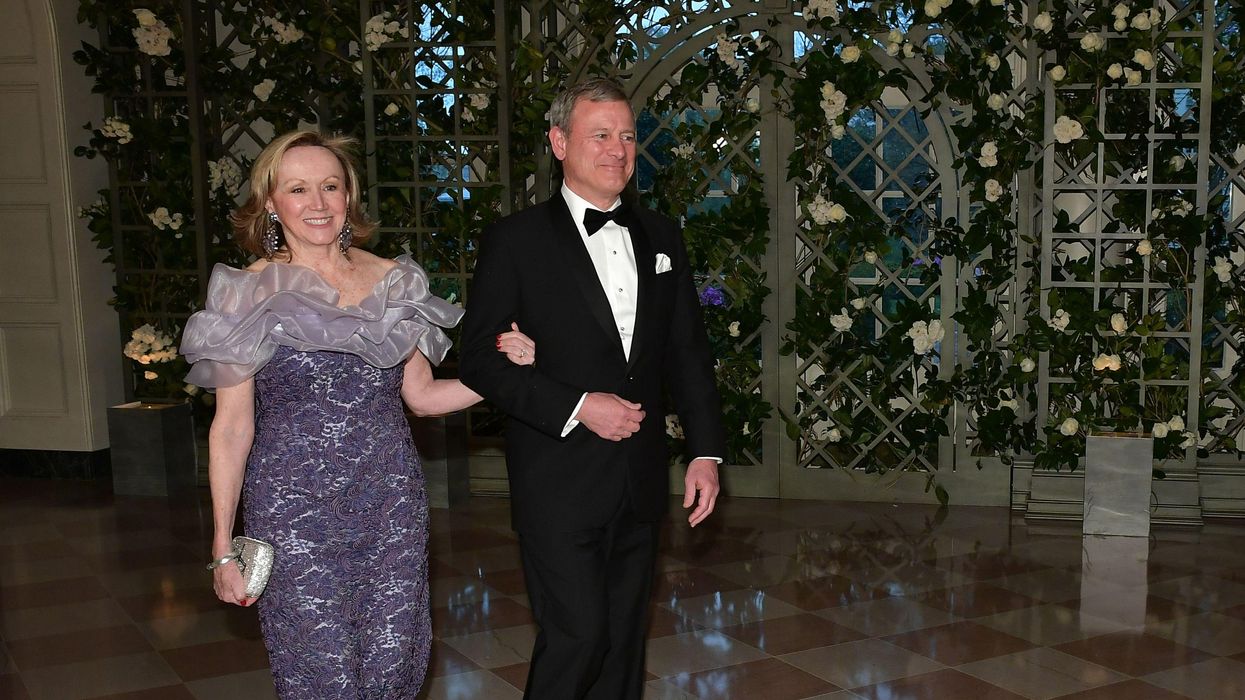John Roberts' Wife Made Millions From Elite Law Firms, Major Companies: Whistleblower Docs
"It almost makes you wonder whether the Supreme Court of the United States is suffering a massive, systemic ethics crisis," said one critic.
A whistleblower from the legal recruiting firm Major, Lindsey & Africa says Jane Sullivan Roberts, the wife of U.S. Supreme Court Chief Justice John Roberts, was paid $10.3 million in commissions over seven years from her job as a headhunter at the company, where she placed attorneys with law firms—including at least one that argued a case before the Supreme Court after the placement was made.
Sullivan Roberts was paid the money between 2007 and 2014, having taken a job with the company two years after her husband was confirmed to the Supreme Court, according to a report out Friday from Business Insider.
The whistleblower, Kendal Price, said in a sworn affidavit in December that he believed "at least some of [Roberts'] remarkable success as a recruiter has come because of her spouse's position."
Price's complaint was reported on earlier this year by Politico and The New York Times, and Insider published new documents regarding the case.
"When I found out that the spouse of the chief justice was soliciting business from law firms, I knew immediately that it was wrong," Price, who worked alongside Sullivan Roberts from 2011-2013 at Major, Lindsey & Africa, told Business Insider. "During the time I was there, I was discouraged from ever raising the issue. And I realized that even the law firms who were Jane's clients had nowhere to go. They were being asked by the spouse of the chief justice for business worth hundreds of thousands of dollars, and there was no one to complain to. Most of these firms were likely appearing or seeking to appear before the Supreme Court. It's natural that they'd do anything they felt was necessary to be competitive."
Insider noted that a spokesperson for the Supreme Court told The New York Times in a prior statement that all nine of the court justices are "attentive to ethical constraints" and obey federal financial disclosure laws.
However, Price's whistleblower complaint was released weeks after ProPublica reported that Justice Clarence Thomas financially benefited for years from gifts from Republican megadonor Harlan Crow, and sold property to him—none of which was previously disclosed to the government as is required by law.
Earlier this week, Politico revealed that days after his confirmation, Justice Neil Gorsuch sold his share of a property to the CEO of a major law firm—and disclosed the sale, but not the buyer.
Sullivan Roberts' $10.3 million commission at her legal recruiting firm was listed as "salary" on Roberts' financial disclosure forms.
"The balance of Roberts' income did not come at a steady rate from a single employer, as 'salary' suggests," reported Insider. "It was paid by the deal and based on a sizable cut of her clients' salaries—a compensation model which varies from year to year depending on her ability to capitalize on her network. The ultimate sources of her income were the firms hiring Major, Lindsey & Africa-backed candidates. Their identities and the specific amounts that they paid Roberts for her services remain unknown."
Price called the justice's characterization of his wife's commissions "misleading."
"Characterizing Mrs. Roberts' commissions as 'salary' is not merely factually incorrect; it is incorrect as a matter of law," Bennett Gershman, a law professor at Pace University, wrote in a memo supporting Price's claims. "The legal distinction between these terms is clear, undisputed, and legally material. If the chief justice's inaccurate financial disclosures were inadvertent, presumably he should file corrected and amended disclosures."
Considering the recent reports on Gorsuch and Thomas, court observers suggested the latest news is more evidence that the Supreme Court is "suffering a massive, systemic ethics crisis."
\u201cMost of Jane Roberts' business comes through referrals: "Successful people have successful friends."\n\nIt almost makes you wonder whether the Supreme Court of the United States is suffering a massive, systemic ethics crisis. https://t.co/7cH3lBzlnO\u201d— Jonathan Guyer (@Jonathan Guyer) 1682707183
"What's the public confidence in a system," asked Joshua Dratel, an attorney for Price, "when the firms which are appearing before the court are making decisions that are to the financial benefit of the chief justice?"

